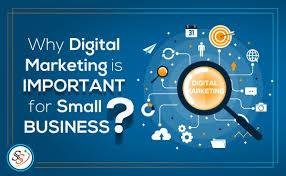In today’s digital age, consumers rely heavily on the internet to research products, compare prices, and find the services they need. This shift in consumer behavior makes a strong digital presence crucial for any business, especially small businesses competing with established players. Here’s why digital marketing is the lifeline for small businesses and how it can empower them to thrive in the competitive landscape: Why Digital marketing is important for small Business.
Reaching a Wider Audience and Leveling the Playing Field
Traditional marketing methods, like print ads or billboards, often have limitations in reach. They target a specific geographic location or demographic, which can restrict a small business’s potential customer base. Conversely, digital marketing works beyond national borders.With a well-crafted online presence, a small bakery in a quaint town can attract customers from neighboring cities or even across the country.
Social media platforms like Facebook and Instagram allow for targeted advertising campaigns, enabling small businesses to reach their ideal clientele directly. Imagine a local yoga studio being able to target its ads towards people in their area who have recently shown interest in fitness activities. This laser focus ensures that marketing efforts aren’t wasted on uninterested audiences, maximizing the return on investment (ROI).
Building brand awareness and credibility
In the past, brand recognition was often associated with big-budget marketing campaigns. However, digital marketing has democratized brand building. By creating a user-friendly website, engaging social media profiles, and informative blog posts, small businesses can establish themselves as thought leaders in their industry Why Digital marketing is important for small Business.
- Content Marketing: Consistently publishing informative and engaging content positions a small business as a reliable source of knowledge. Blog posts, infographics, and video tutorials addressing customer pain points not only educate potential customers but also build trust and credibility.
- Social Media Engagement: Actively interacting with followers on social media platforms fosters a sense of community and allows businesses to showcase their brand personality. Responding to comments and messages promptly demonstrates that the business values its customers and is readily available to address their needs.
Cost-Effectiveness and Measurable Results
Traditional marketing can be expensive, with limited ways to measure its effectiveness. A television commercial might generate brand awareness, but quantifying the actual impact on sales can be difficult. Digital marketing offers a significant cost advantage. Many online marketing tools and platforms cater specifically to small businesses, offering affordable solutions with built-in analytics.
- Website Analytics: Website analytics tools provide valuable insights into user behavior, such as which pages are most visited, how long visitors stay on the site, and where they come from. This data empowers businesses to optimize their websites for conversions and refine their marketing strategies based on concrete results.
- Social Media Insights: Social media platforms offer analytics dashboards that track the performance of posts, reach, and engagement metrics. This allows businesses to understand what content resonates with their audience and tailor their social media strategy accordingly.
By leveraging data and analytics, small businesses can make informed decisions about their digital marketing spend, maximize their ROI, and ensure their marketing efforts are targeted and effective Why Digital marketing is important for small Business.
Building Relationships and Fostering Customer Loyalty
Businesses and their customers may communicate with each other in both directions thanks to digital marketing.Unlike traditional marketing, which is often a one-way broadcast, digital marketing allows for real-time interaction.
Email Marketing: Building an email list allows businesses to connect with customers directly. Personalized email campaigns nurture leads, share valuable content, and promote special offers. Repeat business is encouraged and customer relationships are strengthened by this individualized approach.
Social Media Interaction
- Social media platforms provide a platform for direct communication with customers. Businesses can address customer concerns, answer questions, and build rapport by being responsive and engaging. This fosters a sense of loyalty and encourages customers to become brand advocates Why Digital marketing is important for small Business.
By prioritizing customer interaction and building relationships, small businesses can cultivate a loyal customer base that not only provides repeat business but also advocates for the brand through positive online reviews and word-of-mouth recommendations.
Adaptability and Future-Proofing Your Business
The digital landscape is constantly evolving. New platforms emerge, and consumer habits change. Digital marketing empowers businesses to be adaptable and stay ahead of the curve.
- Staying Updated: By following industry trends and experimenting with new digital marketing tools and tactics, small businesses can ensure their marketing strategies remain relevant and effective.
- Embracing Change: The beauty of digital marketing is its flexibility. Businesses can adjust their campaigns in real-time based on data and analytics. This allows them to adapt to changing consumer preferences and ensure their marketing efforts continue to resonate with their target audience.
In conclusion
Digital marketing is not a luxury for small businesses in today’s world; it’s a necessity. By embracing digital marketing strategies, small businesses can level the playing field, reach a wider audience, build brand awareness, and cultivate loyal customers. The power to compete effectively and thrive in the ever-evolving Why Digital marketing is important for small Business.





